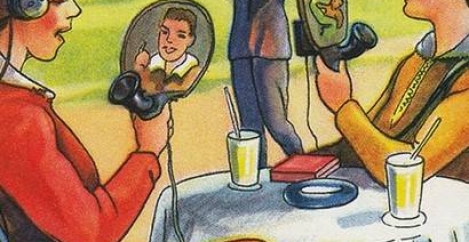March 29, 2019
Smartphone addiction is driven by need to connect, but means we make bad choices
 Two new studies published in the Journal Frontiers in Psychology explore our complex relationships with smartphones. The first study from Canadian researchers, concludes that our addiction to smartphones is a real phenomenon but one that is rooted in a primal desire to connect with other people, suggesting that smartphone addiction is best described as hyper-social, rather than anti-social. However, the second study led by academics in Brazil claims that a pronounced preoccupation with smartphones can lead to poorer decision making.
Two new studies published in the Journal Frontiers in Psychology explore our complex relationships with smartphones. The first study from Canadian researchers, concludes that our addiction to smartphones is a real phenomenon but one that is rooted in a primal desire to connect with other people, suggesting that smartphone addiction is best described as hyper-social, rather than anti-social. However, the second study led by academics in Brazil claims that a pronounced preoccupation with smartphones can lead to poorer decision making.
“There is a lot of panic surrounding this topic,” says Professor Samuel Veissière, from the Department of Psychiatry at McGill University, Canada. “We’re trying to offer some good news and show that it is our desire for human interaction that is addictive — and there are fairly simple solutions to deal with this.”
Nearly everybody has witnessed how they and other people are constantly gazing at their smartphones, although whether this constitutes an addiction for most people is disputed. These are examples of what many consider to be the antisocial behaviour brought on by smartphone addiction, a phenomenon that has garnered media attention in the past few months and led investors and consumers to demand that tech giants address this problem.
[perfectpullquote align=”right” bordertop=”false” cite=”” link=”” color=”” class=”” size=””]Could smartphone addiction be hyper-social, not anti-social?[/perfectpullquote]
But what if we were looking at things the wrong way? Could smartphone addiction be hyper-social, not anti-social? Professor Veissière, a cognitive anthropologist who studies the evolution of cognition and culture, explains that the desire to watch and monitor others — but also to be seen and monitored by others — runs deep in our evolutionary past. Humans evolved to be a uniquely social species and require constant input from others to seek a guide for culturally appropriate behaviour. This is also a way for them to find meaning, goals, and a sense of identity.
Together with Moriah Stendel, also from McGill’s Department of Psychiatry, Professor Veissière reviewed current literature on dysfunctional use of smart technology through an evolutionary lens. The researchers found that the most addictive smartphone functions all shared a common theme: they tap into the human desire to connect with other people.
Healthy urges can become unhealthy addictions
While smartphones harness a normal and healthy need for socialisation, Professor Veissière agrees that the pace and scale of hyper-connectivity pushes the brain’s reward system to run on overdrive, which can lead to unhealthy addictions.
“In post-industrial environments where foods are abundant and readily available, our cravings for fat and sugar sculpted by distant evolutionary pressures can easily go into insatiable overdrive and lead to obesity, diabetes, and heart disease (…) the pro-social needs and rewards [of smartphone use as a means to connect] can similarly be hijacked to produce a manic theatre of hyper-social monitoring,” the authors write in their paper.
Turning off push notifications and setting up appropriate times to check your phone can go a long way to regain control over smartphone addiction. Research suggests that workplace policies “that prohibit evening and weekend emails” are also important.
“Rather than start regulating the tech companies or the use of these devices, we need to start having a conversation about the appropriate way to use smartphones,” concludes Professor Veissière. “Parents and teachers need to be made aware of how important this is.”
Poor decision making
In the second study, Julia Machado Khoury at the Federal University of Minas Gerais and her colleagues identified 47 graduate students aged 18 to 25 who scored high enough to qualify as having an addiction and compared these students’ performance against a set of matched controls on a series of well known decision-making tasks. The study found an inverse correlation between the degree of measured smartphone addiction and the ability to make decisions on the tests.
[perfectpullquote align=”right” bordertop=”false” cite=”” link=”” color=”” class=”” size=””]Smartphone addicts are more focused on rewards than punishments so find risk hard to assess[/perfectpullquote]
The researchers also measured levels of arousal in participants based on skin conductance levels, which they claim indicate responsiveness to rewards and punishments. Compared with the controls, the high scorers on smartphone addiction showed lower skin conductance responsiveness before disadvantageous choices, higher responsiveness after rewards and lower responsiveness after punishments.
This “suggests difficulty in recognising disadvantageous alternatives, high sensitivity to rewards and low sensitivity to punishments,” the researchers concluded, indicating that smartphone addicts are more focused on rewards than punishments so find risk hard to assess. This in turn may explain why other studies have associated smartphone addiction with poor interpersonal relationships and lower levels of productivity, although the researchers also add the usual caveat of suggesting that correlation may not be the same as causation and any pre-existing tendency to favour rewards may be more likely to lead to smartphone addiction.
___________________________________________
















